Most folks are familiar with the various types of SEO.
We have black hat SEO, where people are using techniques like content automation, backlinking software, hacked sites, and sneaky redirects in order to climb the ranks.
On the other side of the equation, we have our white hatters, who like to stay within the guidelines of Google’s terms of service.
Somewhere in the middle, we have the grey hats, who dabble in a bit of both.
 But, you may not have heard about the ever elusive band of SEO’s called the “tin hats.” In a nutshell, tin hat SEO has a lot less to do with actual “ranking” then it does with “generally being freaked the hell out about everything crashing down in a single instant and ruining everything you’ve setup for the past year.” Read about the origin of the term “tin hat” here.
But, you may not have heard about the ever elusive band of SEO’s called the “tin hats.” In a nutshell, tin hat SEO has a lot less to do with actual “ranking” then it does with “generally being freaked the hell out about everything crashing down in a single instant and ruining everything you’ve setup for the past year.” Read about the origin of the term “tin hat” here.
Tin hats are often the butt of jokes in the SEO community. They’re made fun of because of their lack of actual progress in ranking and earning due to the immense amount of time spent geeking-out about Google reading their emails, tracking their IPs, and discovering their foot prints.
Laugh as you might, but we all have a little tin hat inside of us. I know I do.
My personal stance on the whole subject of tracking, spying and what not: I think it’s extremely unlikely that it occurs. I think that Google has too much on their plate already.
Nonetheless, as long as it doesn’t take too much of my time, I figure it doesn’t hurt to take some precautions, just in case. I mean, (as I type this from my homemade bunker with 18 months of water and rations) one can never be too safe.

If you’re the same and you just want to know the essentials of how to protect yourself, you’re in the right place. I’ll be going over some of the common fears from the tin hats related to spying, IPs, document scans and more and the solutions for each.
What I won’t be discussing is the topic of PBN footprints which is a whole subject in itself. For that I will refer you to Daryl Rosser’s PBN guide.
That said, now onto the show:
1) How to Block Google Fonts
Paranoia level: 7/10
The Problem
If you use WordPress for your PBNs, like most of us do, then this applies to you. Certain WordPress themes will call upon Google and ask for a downloadable set of fonts. Not only that, but the WordPress dashboard itself tries to download the font pack whenever you login.
If you look at the HTML source code when such a theme is loaded or when you’re logged into WordPress, it will look something like this…
![]()
The worry is that if you’re logging into many of your PBNs from the same IP address, Google will be able to see all of the different sites that you have WordPress access to, put your whole scheme together, and then blow your shit up.
To safeguard against this, people have tried many things:
- You could avoid using WordPress themes that have this API call, but WordPress itself calls for the fonts, so that does no good.
- You could try to remove the API call from the WordPress installation files, but the file that calls on the fonts is compiled and encrypted, so good luck with that.
- Lastly there’re plugins that claim to help, but I haven’t found a single one that can deal with the WordPress dashboard call.
The Solution: Hack your “hosts” file
Instead of attacking the problem at the level of your sites, simply prevent your computer from ever being able to ask for these files, period.
This is performed by editing the “hosts” file of your computer.
Open up this file and make sure to “Run as Administrator” (read more).
Add the following line to your “hosts” file:
127.0.0.1 fonts.googleapis.com
Save the file and you’re done.
You’ll know it’s working because some sites that you visit are going to be uglier than normal. This is because they’re actually utilizing some of these fonts and are now unable to download them.
This is the price we pay for paranoia.
2) Browser, Account, and Search History Tracking
 Paranoia level: 8/10
Paranoia level: 8/10
The Problem
Have you ever had any of the following questions when you’re doing your work as an SEO?
- If I’m logged into my Google account when I’m searching, will Google be able to track all the sites I go to?
- If I use Chrome, will Google be able to see all the PBNs I log into?
- If I leave my search history turned on, will Google be able to destroy my life?
The tin hat philosophy behind this is similar to the Google fonts idea. If you’re being tracked, then essentially a complete list of sites that you visit and log into, is visible to Google.
There’re a couple of different solutions that I don’t quite recommend.
You could always:
- Switch to a new browser like Safari
- Make sure you never login to a Google account
- Always clear your search history
- Never save cookies
- Use a VPN to switch up your IP whenever you log into a PBN
However, this kind of defeats the purpose of using a modern browser that will save your passwords, perform autocomplete for you when you’re trying to work quickly, bookmark your sites, etc.
Not only that, but you’re still not fully untrackable. Even when you’re using a VPN, a simple webtrc command can pierce the veil.
Alternatively, you could use a browser like Epic Browser. This company can indeed successfully pull off what’s necessary to block you from being tracked.
However, this company and others like it make money from selling data. Specifically, the behavioral data collected from your browsing experience which is especially valuable for advertisement companies.
Essentially your tracked data isn’t directly readable by Google, but perhaps it might be in the future when the price is right. This is Inception level tin hit at its finest.
Luckily there’s an alternative.
Solution: Opera Browser with the Ghostery Plugin
The Opera Browser (to date) is not affiliated or partnered with Google at all, and is actually performs extremely well compared to its other non-affiliated peers. Between Opera and Firefox, I personally felt like Opera smashed it.
Browser Speed Comparison Table
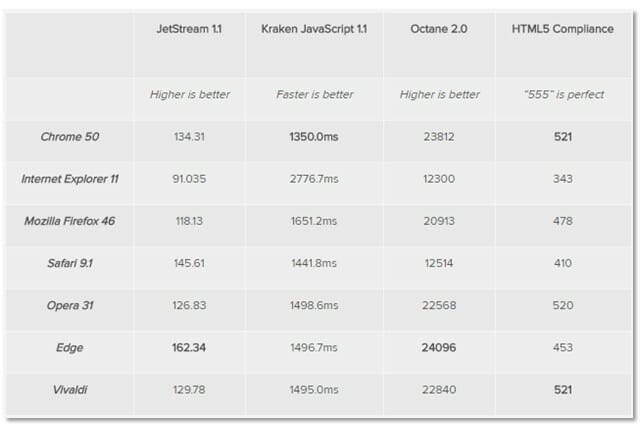
Courtesy of DigitalTrends.com
Once you have Opera installed, download the Ghostery plugin.
Ghostery is a solid plugin and privacy tool that can effectively block your browser from sending any outgoing information. Just be sure you don’t opt-in when you’re installing it or it will sell your data to advertisement agencies, just like Epic Browser.
Here’s how to effectively set it up.
1) Install the plugin and go to the settings
2) Make sure the opt-in Ghostrank is turned off and the auto-update is turned on
3) Select all types of trackers and enable all of them.
3) Save
4) Go over to advanced settings and make it look like this:
Now when you go to a website that instigating tracking, you can actually see what all is getting blocked by Ghostery.
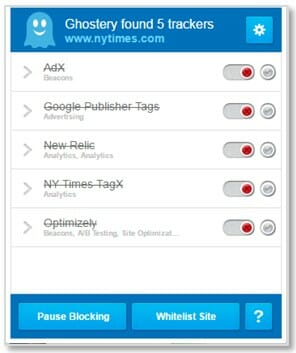
3) Gmail is Scanning Your Email Content
Paranoia level: 6/10
The Problem
It’s a well-known fact that Google scans the content of our Gmail accounts in order to serve us up advertisements that can potentially create revenue. They clearly state this in their terms of service.
Not to worry though, this process is performed algorithmically and based on filters. The only instance where a filter will trigger human interaction is in the case of child abuse/porn which, in my opinion, they have all rights to take action.
Nonetheless, if you want a full-proof solution to privacy…
Solution: Setup a Domain and Create Your Own Email Address
Simply register a domain and setup an email address for it.
This is a no-brainer anyways if you own an SEO agency, but even if you’re just starting out in SEO or stick mostly to doing affiliate SEO on your own, it never hurts to have a branded domain and your own email address.
Setup basic email on this account and then install either Outlook or Thunderbird on your laptop or home computer.
Personally, I prefer the features of desktop mail software over Gmail anyways. Got to love that “Do not deliver before” feature.
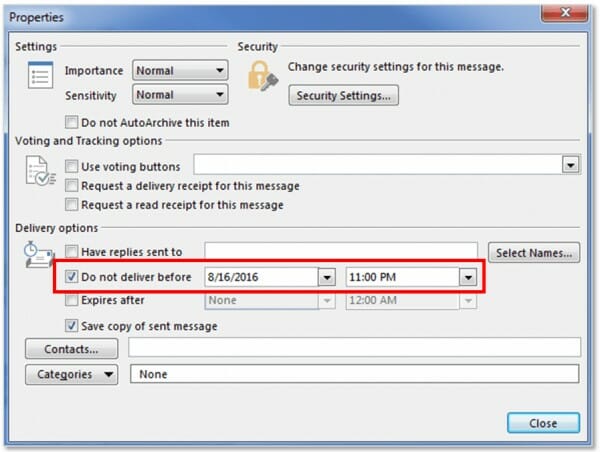
4) Google has access to your Google Drive Sheet and Documents
Paranoia level: 6/10
The Problem
The Google terms of service is written in such a way to cover all of its products when it comes to being able to mine data from you. So just like Gmail, the Google Drive spreadsheets and documents applications are open for inspection.
To function properly in SEO, one needs to manage and track data such as backlinks, PBNs, etc. If you travel or manage a team, then your spreadsheets and SOPs need to be stored in the cloud. This will enable you, or anyone else, to always be able to access the most up-to-date version of the files you’re editing. The alternative of coordinating and uploading via Dropbox is simply a nightmare.
The Solution: Zoho Docs
Zoho Docs is essentially an all-in-one solution for online document management. It has everything you need as far as creating documents goes:
is essentially an all-in-one solution for online document management. It has everything you need as far as creating documents goes:
- Spreadsheets
- Word documents
- Presentations
For free, you can create a basic account which will give you and two other people access to your documents.
In terms of how Zoho Docs fares against the other free online document editors, it’s solid. You can copy and paste freely between documents, create complex functions on spreadsheets, graph, the works. If you’re currently a One Drive user, once you switch over to Zoho, you’re going to think it’s the best software you’ve ever used.
I use Zoho for all of my management tasks. This includes tracking offsite SEO campaigns, managing budgets, writing SOPs, and more.

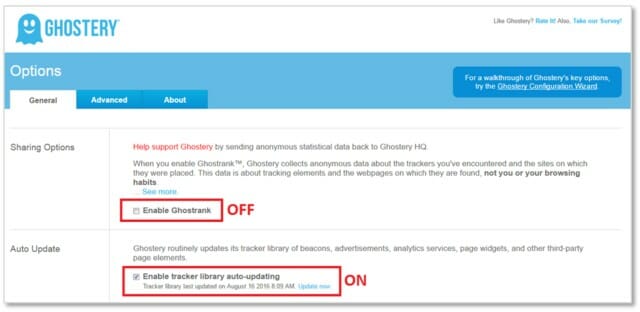
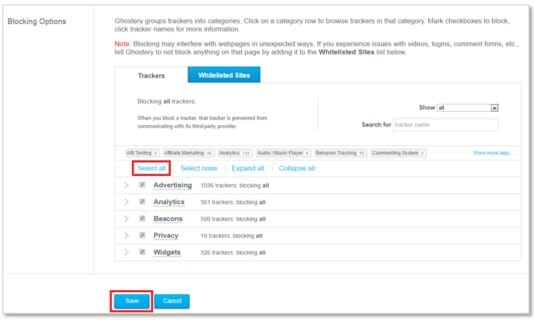
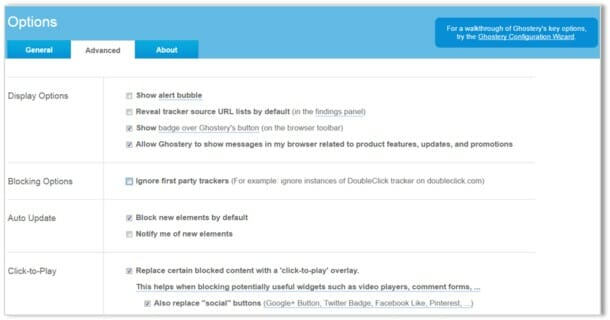


Nothing about UFO’s?
Hah!
Awesome article, I will apply this today
Thank you so much
I’m not a fan of Ghostery. I would recommend ublock origin. Blocks adds and all the stuff you don’t want. For advanced blocking there is also a plugin called umatrix. Check it out.
Thanks for the tip.
Great article – I’d suggest that if you downloaded all the google fonts and saved them in your fonts folder (I’m on a mac so unsure where this is in PC) then the browser will render the sites as expected as they will reference your local copies.
Nice workaround!
Thanks for posting this Matt. I have been using Zoho docs for managing my sites and it is by far the best doc management tool.
I will add the block google fonts to my host file…did now know that we could do that!
To add to what you have already mentioned in the post, look into WebRTC IP leaks. You may want to add this to the list and the plugins to block you real IP showing.
Cheers
Anurag
The best way to solve all paranoic issues is to use one management center for PBNs (or for clusters of PBN). If you don’t need to login to WP dashboards, and visit this websites directly, Google can’t track your behavior on these websites.
Hey,Matt,
Super awesome article !! I always do my PBN work with VPN+ Mozila browser. For some PBN’s I do have other browsers too !!
What do you think about TOR browser ? I guess that is also a good solution.
Cheers
TOR is overkill.
Pranav, you can use NORD VPN it uses TOR to encrypt the shit out of everything. It’s slower than expressvpn but it’s great when your hacking government websites or just posting affiliate content for best vacuum cleaners.
I tried using Zoho but it’s soooo slow and I have a semi decent PC with a fast connection. I couldn’t imagine what my VAs were experiencing so stopped using it. But some cool takeaways here!
What did you start using instead of Zoho?
You might want to have a look at airtable.com
hi Doug could you tell us about airtable ?
Instead of Opera + Ghostery you could just use the Epic Privacy Browser. I’m a big fan, not just for tin hat SEO purposes. It’s completely tracker and tracer free and comes with a built-in encrypted proxy.
Cheers.
Great article Matt as always. Thank you! I recommend Vivaldi browser. It’s much faster than Opera although it’s a company owned by Opera Software.
Haha, I had a client once that called me freaking out because I sent him an email that had the word “PBN” in it. From then on out we had code words for PBN. Def Tin hat…
Solid post Matt, you can never be too paranoid in this game.
I’d also move totally away from gmail and use encrypted mail providers. Here’s a few I use that are free and good:
Safe-mail.net
Protonmail.com
tutanota.com
Nice suggestions.
I have already applied all 4 suggestions today. I have another thing to share which may help even more in privacy. Opera browser has built in VPN which we can enable if we need. To secure the VPN further, WebRTC leak prevention plugin has to be installed and thus, your IP will be hidden completely. Here is the plugin link – https://addons.opera.com/en/extensions/details/webrtc-leak-prevent/?display=en#
Cool stuff.
went to go try this out…but my ghost settings page is way different then what you showed..to much work not knowing…lol
Ive installed this on 3 different browsers and still dont get the advanced tab????
https://gyazo.com/dd7438550982dce60d999b1b66bc1f46
Click on “Blocking Options”. Looks like they updated their UI.
What I am concerned about, is all of this necessary? In your experience have you had to worry about it ever? I know it is good to be on the safe side but just wondering.
Thanks for the article btw. 🙂
Actually, I’ve never had to worry about it. Because I took these precautions. That’s the point.
Whether or not this is useless (probably is) or not, wouldn’t you just rather spend a few minutes to have that emotional and mental space back?
Great article as always Matt! I recently discovered your blog and became instant fan! 🙂 I have a request, I don’t know if you’ve already made a guide something like creating a PBN that google loves and at the same time escapes manual checks? I would like to know how do you create it from scratch. From how to pick domain name, hosting, IPs, logging in anonymously, setting them up (with topic relevance, keyword usage etc.) and how to write content for them to make them legit at your perfection.
If there’s something you’ve already written, please share link or if not, please write something like this 🙂
Regards,
Syed
Hi Syed. Thanks for the nice words. Somethings though, like business IP, are best kept secret.
Can also use element hider to block specific elements within a site: http://i.imgur.com/OssY3wS.jpg
Either throughout all sites or site specific. Can even trim it down to all google elements.
I like to put on my “full tin body armor” and never touch my PBNs without dedicated proxies, a bullet-proofed browser, and a separate pc. I am often the butt of jokes for it, but taking an extra 30 seconds here and there to prevent losing my investment is worth the peace of mind. Nice post, Matt.
Glad to help.
Here are some extra quick tips
– Opera has a plugin called “Install Chrome Extensions” that finally made me switch from Chrome to Opera.
– https://myactivity.google.com/myactivity allows you to prevent Google storing a lot of the data they get on you.
– My favorite Google calendar alternative: “Fantastical” app for iPhone, and “One Calendar” for my windows PC.
Hope this helps some people. 🙂
Nice Danish contribution.
Comments are closed.